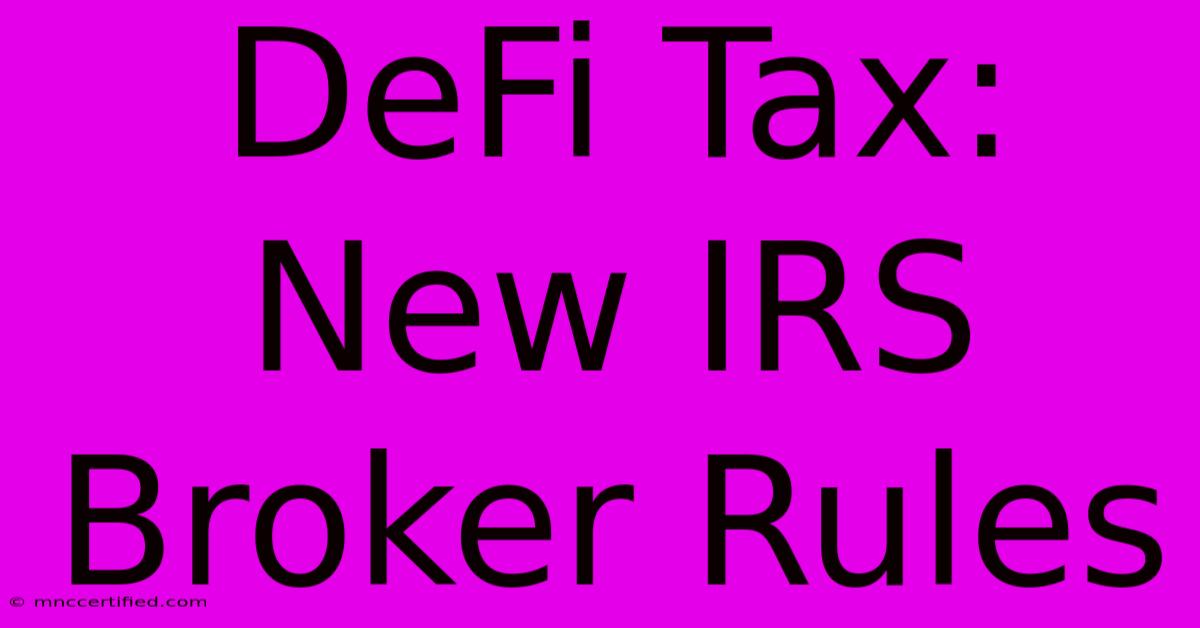DeFi Tax: New IRS Broker Rules

Table of Contents
DeFi Tax: Navigating the New IRS Broker Rules
The world of Decentralized Finance (DeFi) has exploded in popularity, offering exciting new opportunities for investors. However, with this growth comes increased scrutiny from tax authorities, particularly the Internal Revenue Service (IRS) in the United States. Recent changes to IRS broker reporting rules significantly impact how DeFi transactions are taxed, creating a need for greater understanding and proactive tax planning. This article will break down the new rules and explain how they affect your DeFi investments.
Understanding the Expanded IRS Broker Definition
The IRS has broadened its definition of "broker" to include a wider range of entities involved in cryptocurrency transactions. This expansion has crucial implications for DeFi platforms and users. Previously, the definition largely focused on centralized exchanges. Now, it encompasses platforms facilitating the exchange of digital assets, even those operating on a decentralized model. This means many DeFi protocols, Automated Market Makers (AMMs) like Uniswap and Curve, and lending platforms such as Aave and Compound, are now considered brokers under the IRS's expanded definition.
This expanded definition mandates these platforms to report certain transaction details to the IRS on behalf of their users, including:
- Gross Proceeds: The total value received from transactions.
- Cost Basis: The original value of the asset at the time of acquisition.
- Date of Transaction: The specific date of each transaction.
Failure to report these transactions accurately can lead to significant penalties.
DeFi Tax Implications for Individuals
The new rules dramatically change the tax landscape for DeFi users. Previously, the lack of clear reporting mechanisms made it easier to overlook or misreport DeFi transactions. Now, with the IRS receiving direct reports from brokers, accurate reporting is paramount.
Here's a breakdown of key tax implications:
Capital Gains Taxes
Any profit from selling DeFi assets (tokens, NFTs, etc.) is subject to capital gains tax. This tax rate depends on how long you held the asset: short-term (held for one year or less) or long-term (held for more than one year). Long-term gains are generally taxed at lower rates than short-term gains. Understanding your holding period is crucial for accurate tax calculations.
Income Taxes from Yield Farming and Staking
Income generated through yield farming and staking activities is considered taxable income. This includes rewards earned from providing liquidity on AMMs or staking tokens on various platforms. These rewards are taxed as ordinary income, typically at a higher rate than long-term capital gains.
Wash Sales
Be mindful of wash sales. If you sell a DeFi asset at a loss and repurchase a substantially identical asset within 30 days, the IRS will disallow the loss deduction. This can significantly impact your tax liability.
Navigating the Complexity: Strategies for Compliance
Given the complexity of DeFi transactions and the expanded reporting requirements, proactive tax planning is essential. Consider these strategies:
- Maintain meticulous records: Keep detailed records of all DeFi transactions, including dates, amounts, and blockchain addresses. This will be crucial for reconciliation with IRS reports.
- Use tax software designed for crypto: Several specialized tax software programs can help track DeFi transactions and automatically generate the necessary tax forms.
- Consult a tax professional: A tax advisor specializing in cryptocurrency and DeFi can provide expert guidance to ensure compliance and minimize your tax liability. They can help navigate complex scenarios and ensure you leverage all available deductions and credits.
- Understand the differences between centralized and decentralized exchanges: While both are subject to tax, record-keeping and reporting may differ slightly. Understanding these differences is crucial.
Staying Ahead of the Curve: Future Considerations
The DeFi landscape is constantly evolving, and so are the tax regulations surrounding it. Staying informed about upcoming changes and updates from the IRS is vital. Following reputable financial news sources and engaging with experts in the field will help you maintain compliance.
Disclaimer: This article provides general information and should not be considered financial or tax advice. Consult with qualified professionals for personalized guidance tailored to your specific situation.

Thank you for visiting our website wich cover about DeFi Tax: New IRS Broker Rules. We hope the information provided has been useful to you. Feel free to contact us if you have any questions or need further assistance. See you next time and dont miss to bookmark.
Featured Posts
-
College Tennis Pavia Vs Haynes Prediction
Dec 28, 2024
-
Premiership Smith Vs Pollard Clash
Dec 28, 2024
-
Nba Mavericks Vs Suns Highlights
Dec 28, 2024
-
Rugby Team News Smith And Pollard
Dec 28, 2024
-
Ipswich Vs Arsenal 0 1 Key Stats
Dec 28, 2024